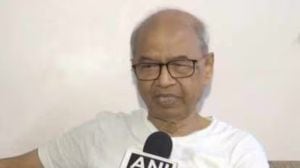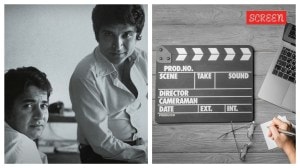What I object to is the presumption that government officials have got all the knowledge and locals have none
The first woman to win the Nobel for Economics (2009),Dr Elinor Ostrom talks to The Indian Express Editor-in-Chief<b>Shekhar Gupta</b>on NDTVs Walk the Talk on economics,governance and the idea of commons.
SG: We have this week,Dr Elinor Ostrom,a brilliant Nobel prize winner and the first woman to win the Nobel for Economics (2009). You won the Nobel and there were some good headlines and some nasty headlines. Some people said it was even more surprising than Obama getting the Nobel.
Yes,but I did not spend too much time reading the not-so-nice ones,I dont get defensive. I have been turned down for so many things. When I went to graduate school,people told me I shouldnt go to graduate school.
SG: Why?
I was doing graduate work in the late 50s-early 60s and at that point,women could not get an academic position. They could get a position in city collegesand universities did not want to admit someone who wasnt going to get a job in a major university.
SG: To simplify it for a lot of our Indian viewers,graduate work in America means working towards a PhD.
Yes. And since I had the grades,I had to be admitted as an under-graduate and then I had to work four years in private industry and came back to graduate school. It was tough.
SG: And yet,there was male opposition?
Yes. The faculty in economics said no. The faculty in political science finally,given that I had been taking some graduate work,said yes. And then I minored in economics. So I had a political science degree but I had a minor in economics with very good economists on my committee.
SG: So,you made a good sideways entry back into economics. I was reading one of your comments in one of your interviews in which you say that when you faced this opposition,you were a tough son of a gun?
Basically,I had had enough fights earlier. I was in Boston as a young person without any foundations and I needed a good job and it was all can you type and take shorthand? So eventually,I talked my way into a professional position as an assistant personal manager in a downtown Bostonian firm. I volunteered to work for them for six weeks or two months or something like that without pay and they finally hired me and then they paid me.
SG: So what is the nastiest you faced by way of opposition or by way of sabotage or craftiness or just deviousness?
I dont have any ranking and fortunately now in the last 5-10 years,there has been much less trouble. But then the kind of work my husband (Vincent Ostrom) and I have done,is radical enough. Some people are just upset about it because some of our work is mathematical and game-theory and all the rest. Some of our work goes out and does individual case studies and some people think that is old-fashioned.
SG: Because in your universe,some people would say its anecdotal,which is almost like an abuse.
Yes. And so my dissertation was a great big thick thing on how ground water producers in Southern California,earlier in an urban area,in LA,were able to solve a very very tough problem. They were pumping water down and the salt water was going in and they developed a whole series of strategies to solve it and solve it very successfully.
SG: And they did it through the idea of sharing because that is really your fieldthe idea of commons,the idea of sharing?
They also had to get accurate data and so part of the solving was to get a really good accurate idea of who had been producing,how much had they produced,and what are the boundaries of the basin.
SG: Exactly,you need data. Something like that is very relevant to India because our water tables are going down in many parts of the country.
Oh yes,you do.
SG: And its linked to free power to farmers.
Do they get charged for electricity?
SG: No. There is a problem.
You dont get charged for the water. You dont get charged for the electricity. What else do you expect?
SG: The counter answer to that is that the farmer has a tough enough life,so how can you charge him for power?
Well,if he takes all the water that is underground that took 200,500,a 1,000 years to get there…see the groundwater basin can slowly but surely collapse down and getting it too far down is very very dangerous.
SG: So,the way out issince it is a very relevant question in Indiathe way out is to make people pay for water,to make them pay for power,but empower them. How do you do that?
Yes. Well,there is no one way and youll hear me say that many times because part of my big concern about policy now is that people now do analysis and then they say this is the way to solve this. You have to have some mechanism that gives good scientific data about the structure of the basin.
SG: And once you have it?
Well,if you enable people who are in a particular basin to organise themselves in ways in getting good accurate data and figure out what they have done in the past and then mechanisms for them to get firm water rights,that is very tough.
SG: And get it out of the government or bureaucracy or discretionary powers.
Well,no. Not entirely because the source many times of good scientific data about groundwater is government agencies.
SG: No,once you get the data,once you empower the communities,then dont have a government bureaucrat sitting on top of them (saying) you can take this much water,you can take that much water.
Well,the ones that are successful in Southern California are the ones that created special districts. So,they created a government unit at the same scale as the groundwater basin and they imposed taxes on themselves so every acre-foot you pulled up or hectare-foot or hectare-metre I guess,they had to pay tax,but the tax did not go to a higher-up. It remained at the same level as the groundwater basin and they could use it to invest in how to reclaim sewer water and get it into good shape so that you could use it to reclaim salt water.
SG: Your larger view seems to be that the answer is not the government and the answer is not the market.
And the answer is not the community.
SG: The answer is not the community? What is the answer?
No. There isnt one.
SG: Give me a bunch of answers.
Well,one,my husbands work and mine on the word polycentricitythat is not a very widely used term but my husband worked on this in the early 60s with Charles Tiebout,and its a notion that sometimes what you need are nested systemssome are quite small and some are medium and some are a little bit larger and some are all the way up. So in a metropolitan area where they have found ways of providing services effectively and efficiently and fairly,you may have neighbourhoods organised as small communities.
SG: But you seem to think,if my reading is correct,that communities or societal groups,are more egalitarian than the market.
Sometimes yes,but there are communities in places that Ive studied in the world including Nepal,and I know of some of the research here in India,and some of them are very hierarchical.
SG: In this part of the world,you have caste,which is the worst kind of hierarchy that you can see.
And I have seen in Nepalthe caste system in Nepal is a little weaker than it is here. But Ive studied forests and it was a government forest and the government had taken it from people 20 or 30 years ago. It was degraded. They gave it back and the high caste people all came to the meeting. They signed and then they passed a rule immediatelyno charcoal burning. That meant that low caste people who had been able to make a living,were not allowed to do so anymore. So,I dont have any naive belief because I have seen corruption at all levels. I have seen power-grabs at all levels. So what I dont want is that everything has to be solved by the government and I dont want us to think that everything needs to be solved by the community.
SG: Paul Krugman,who obviously agrees with a lot of work you do,said that the Nobel to you was finally the acknowledgment of a very small minority of economists who work in areas such as yourselfjust number-crunching.
Well,we have done a lot of very qualitative in-depth understanding of what is going on in the field but I have also done game theory.
SG: So,this very special idea of going and engaging with communities…does it come from your political science education or was it something that evolved in your mind as you analysed economics?
Both. I was very much influenced by James Buchanan and Gordon Tullock and their early work on the logic of constitutional choice. They focused on polycentric systems,only they didnt use the term. They were looking at self-governance and how people form organisations and Buchanan did win a Nobel Prize. So I was very much influenced by Buchanan. I am very much influenced by Amartya Sen.
SG: What is it about Amartya Sens work that you find interesting?
His concern with equity,and that instead of just efficiency,we should be thinking of how to enhance equitable arrangements. He also has a pretty good sense of local levels and the higherthey can be quite fair or they can be quite over-powering and corrupt. Why should we think that people who are now in the government are all good and people at the local level are all bad?
SG: Where do you disagree with Amartya Sen?
Right at this moment,I cant think of any place I disagree.
SG: I have never met two economists who dont disagree.
Well,maybe then I am really not an economist. If you are a modeler,you will find ways to say that model isnt very good but Sen is not a modeler. He tries to look over time. He tries to understand fairness and then to try and get away from the sense that there is that big problem and thus you have to have that big unit. If you can…find ways about getting boundaries to around small communities and enhance their capacity to cope with that problem locally and also have mid and larger units. So,we can actually do something in terms of climate change by helping people at a local level organise more effectively.
SG: I presume you are following the climate change debate? How do you apply your own work?
Ive written an article or two… I have several articles on a polycentric approach to climate change.
SG: I like that expressionpolycentric approach.
Yes,I do too. And it is very important to understanding our work. Now,look at this grassy area. We could be looking at the origin and soil type and come up with something here…we need to do some watering and there looks like there is a need of some fertiliser and then we go to that area right there and it is different and what you need to keep that area in good condition is different from what you need for this. And that is what ecology and biology and botany have taught but they havent taught social scientists as much as they need to.
SG: So everybody has to be polycentric. So if I may simplify it,what you need to solve a problem like climate change is not one mantra but a whole book of scriptures.
Yes. And there are 17 things that you can do in a household that will reduce greenhouse gasone of those is to get your hot water heater turned down. When I have to give talks on this,I ask frequently how many people get in the shower and turn the hot water only on? Usually its nobody because theyd burn themselves. If they are going to burn themselves,you are paying to heat the water to the level that you are going to burn yourselves if you didnt use cold water. Now isnt that stupid? So if you get your hot water heater down,then you dont have to use cold water. You dont have to heat it all the way up.
SG: And then cool it down.
Yes,and you dont need it that hot for doing dishes. You dont need it that hot for doing clothing. Its a small thing but the various ways of getting feedback to people about how much they are using. Some utilities in the States are giving you information about how your use of electricity is above-average,about-average or below and as soon as that got started,the average started going down. Research shows that when people have dials and get very good accurate information,they use less.
SG: They become conscious.
So there are very many things that can be done.
SG: Another idea if you could just elaborate on,is your seven-generation theory.
Oh,that is not mine,that is of the indigenous people of the US.
SG: But you have articulated that.
I have articulated it because I thought it was a wonderful idea and if you were in a group and you were talking about an issue and were thinking about what do we do,the option would be,lets think about how that impacts the seventh-generation now.
SG: Seven generations starting with me.
Yes,but that is a fair distance in the future.
SG: Even in India,its a common expressionseven generations,saath peedhi,even if a politician makes a lot of money,he has made enough for his seven generations. Or if somebody has done a lot of pious work,you say he has earned enough credit with the almighty for his seven generations.
Thats interesting. But I think that is one of the reasons I urge people to respect the indigenous people. In terms of health knowledge,there is a lot of indigenous knowledge about herbs and other things that work for illness and how to manage illness in an effective way. But we also find that sometimes indigenous knowledge is wrong and as we do tough science,we say no,thats wrong.
What I object to is the presumption that the government officials have got all the knowledge and locals have none. On the other hand,I dont want to say the government officials dont have any because there are times when you can have access to good scientific information at a large scale.
SG: As a journalist,if I can review your work,I think there is one gap there. You have not worked in India as yet. So please come and spend more time here.
That would be nice.
SG: Tell us a little more about how to apply your solutions to a society as diverse,as caste-ridden and peculiarly hierarchical as ours.
Arun Aggarwalhe was a very close colleaguehas done some very serious work here,and Veena Aggarwal. So there is excellent work being done. We will talk about some of it in Hyderabad in a few days as we have a conference there.
SG: I am sure that Arun Aggarwal and Veena Aggarwal will be very happy listening to this. At the same time,I am sure they will be as happy as I will be if you came and worked in India. So until then,it has been brilliant chatting with you.
Transcribed by Uttara Varma





- 0114 hours ago
- 0214 hours ago
- 0314 hours ago
- 0414 hours ago
- 054 hours ago


























